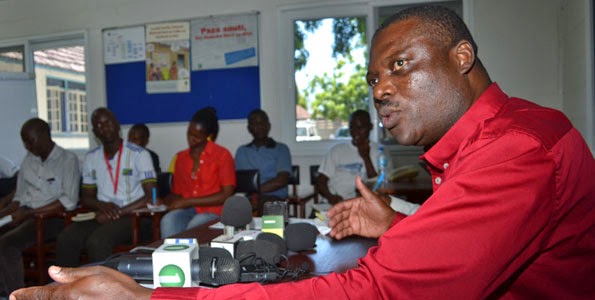Campaigning for a child marriage-free Tanzania.
Child marriage in Tanzania limits girls' access to education and exposes them to serious harms, Human Rights Watch said in a report released today. Human Rights Watch documented cases in which girls as young as seven were married. The government should set 18 as the minimum marriage age for girls and boys as a first step toward eradicating child marriage and improving the lives of girls and women.
The 75-page report, "'No Way Out': Child Marriage and Human Rights Abuses in Tanzania," documents how child marriage severely curtails girls' access to education, and exposes them to exploitation and violence - including marital rape and female genital mutilation (FGM) - and reproductive health risks. Human Rights Watch examined the gaps in Tanzania's child protection system, the lack of protection for victims of child marriage, and the obstacles girls face in attempting to obtain redress, as well as shortcomings in existing laws and government plans to combat child marriage.
"Tanzania's draft Constitution unfortunately provides no minimum age for marriage," said Brenda Akia, women's rights research fellow at Human Rights Watch and author of the report. "The Tanzanian government should show leadership on child marriage by making 18 the minimum age in the Marriage Act and providing stronger protections against child marriage."
The Human Rights Watch report is based on in-depth interviews with 135 girls and women in 12 districts in Tanzania, as well as with government officials, local activists, and international agency personnel.
Tanzania's Marriage Act of 1971 sets the minimum age at 18 for boys and 15 for girls with parental consent. It also permits both girls and boys to marry at 14 with a court's permission. The Constituent Assembly, tasked with writing a new constitution, missed an opportunity to include a uniform minimum marriage age in its October 2014 final draft, Human Rights Watch said.
The Tanzanian government plans to review the Marriage Act, based on recommendations by the Tanzanian Law Reform Commission, and will finalize a government paper for public consultation after the conclusion of the constitutional review process.
Although child marriage rates in Tanzania have decreased in recent years, they remain unacceptably high, Human Rights Watch said. Four in 10 Tanzanian women married before turning 18, according to government statistics.
Nineteen-year-old Anita's father forced her to marry at 16, during her second year of secondary school. "My father said he did not have money to support my schooling," she said. "I then discovered that he had already received 20 cows as dowry for me."
Judith was 14 and working as a domestic worker when she married to escape abuse and exploitation by her employer. "A houseboy in the house I was working in asked me to marry him," she said. "I agreed - because I saw marriage as my only option to escape mistreatment from my boss."
Girls told Human Rights Watch that their families forced them to marry so they could get dowry payments, because they did not value their daughters' education, and because the girls were pregnant or their families feared that they would become pregnant and bring disrespect to the family. Other girls said they saw marriage as a way out of poverty, violence, neglect, or child labor.
Discriminatory and vague government education policies and practices facilitate early marriages, seriously undermining girls' education and opportunities, Human Rights Watch said. Many Tanzanian schools have mandatory pregnancy testing. The government also allows schools to expel or exclude married students or students who commit offenses "against morality," widely understood to include pre-marital sex or pregnancy.
The government's Primary School Leaving Examination, which determines which pupils may proceed to secondary school, also exposes girls to child marriage, Human Rights Watch found.
Salia J., 19, was forced to marry at 15 after failing the leaving exam. "My father decided to get me a man to marry me because I was staying at home doing nothing," she said.
"Mandatory pregnancy tests and expelling pregnant and married girls from school seriously infringes on their rights, especially to education," Akia said. "The government should scrap its discriminatory regulations and enable pregnant and married girls and young mothers to continue with their education."
Child marriage puts girls and women at greater risk of sexual and gender-based violence, Human Rights Watch said. Girls who rejected or tried to resist marriages said their families assaulted and verbally abused them or threw them out. Those unable to escape marriage said their husbands beat and raped them and did not allow them to make any decisions in their homes or about their lives.
A large number of those interviewed said their husbands abandoned them and left them to care for children without any financial support. In some cases, girls experienced violence and abuse at the hands of their in-laws. Girls from the Maasai and Gogo ethnic groups said they were forced to undergo FGM to prepare them for marriage.
The government should work toward comprehensive reform of marriage and divorce laws, including setting the minimum marriage age at 18, Human Rights Watch said. It should enact a domestic violence law to make sexual violence in marriage a criminal offense and develop a national action plan to prevent and address the consequences of child marriage.
The government should also put an end to pregnancy testing in schools, allow both pregnant and married students to remain in school, and take all possible steps to allow all children to attend secondary school irrespective of their Primary School Leaving Examinations.
"Child marriage has far-reaching negative impacts on girls and women," Akia said. "Tanzania's government should take immediate and long-term steps to end the practice, and give survivors much needed psychological, social, and economic support."













